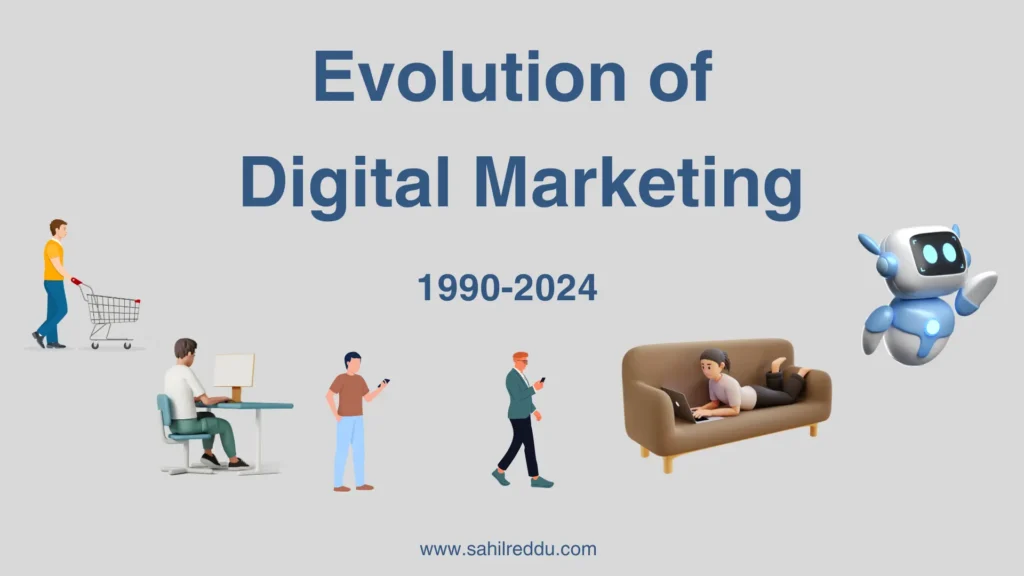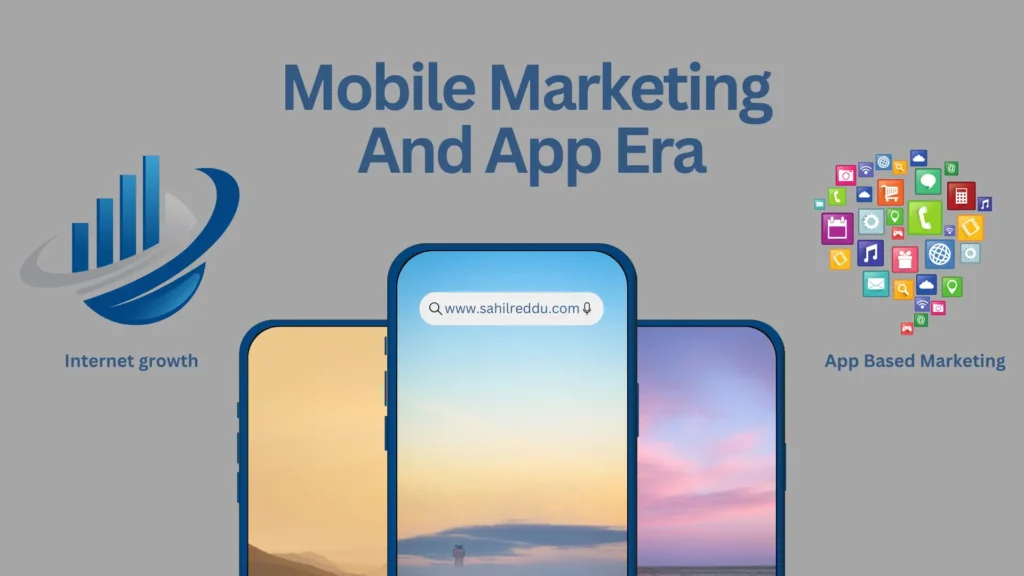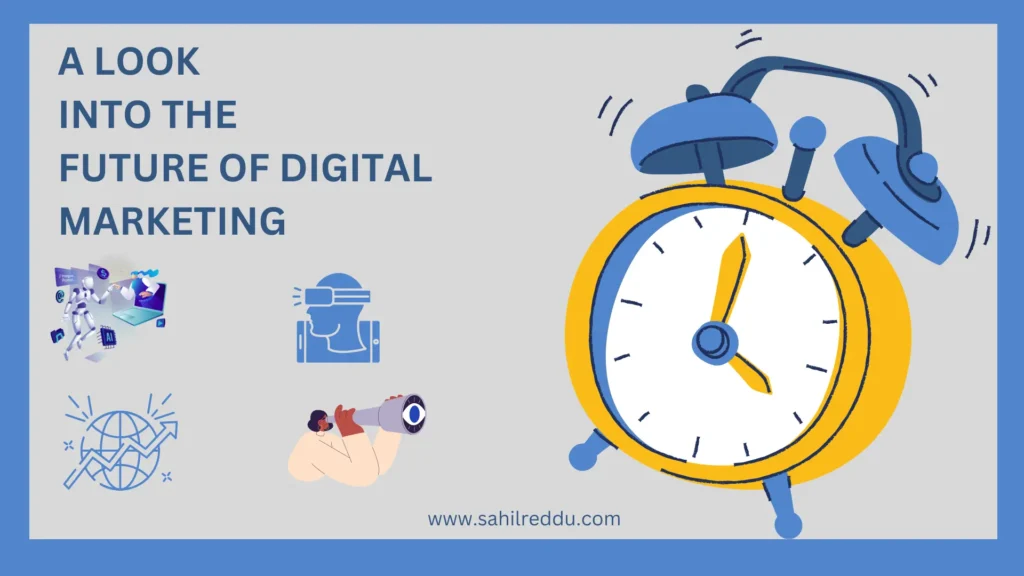Evolution in Digital marketing has transformed dramatically since the 1990s. Initially, businesses utilized email marketing and simple websites to reach customers. The 2000s introduced search engines like Google, leading to the rise of Search Engine Optimization (SEO) and Pay-Per-Click (PPC) advertising. The late 2000s and early 2010s saw the social media boom, with platforms like Facebook and Instagram changing how businesses engage with audiences. Content and influencer marketing also gained traction. The mobile revolution followed, with the widespread use of smartphones, prompting businesses to create mobile-friendly websites and apps. In the data-driven age, marketers leverage big data for personalized marketing and use tools like AI and marketing automation. Looking forward, technologies like AI, voice search, and augmented reality are set to shape the future of digital marketing, offering innovative ways for businesses to connect with their audiences.

The Rise of Search Engines and SEO
The rise of search engines marked a significant milestone in the history of digital marketing. In the early 1990s, search engines like Yahoo emerged, but it was Google’s launch in 1998 that truly revolutionized online marketing. These search engines provided users with an efficient way to find information, drastically changing how businesses reached their audiences.With the advent of search engines, Search Engine Optimization (SEO) became crucial for businesses to improve their online visibility. Early SEO tactics were relatively simple, focusing on keyword stuffing and basic link building to rank higher in search results. However, as search engines evolved, so did their algorithms. Google’s frequent updates, such as Panda, Penguin, and Hummingbird, aimed to deliver more relevant and high-quality search results, penalizing manipulative practices.
This evolution led to the adoption of more sophisticated SEO techniques, emphasizing quality content, user experience, and ethical link-building strategies. Today, SEO is an essential component of digital marketing, requiring continuous adaptation to changing algorithms and best practices
Social Media Revolution
The evolution of social media began in the early 2000s with platforms like MySpace and Facebook, revolutionizing how people connect. The late 2000s saw the rise of Twitter and LinkedIn, followed by Instagram and Snapchat in the 2010s. Today, platforms like TikTok continue to innovate, shaping communication and marketing.
Emergence of Social Media Platforms
The emergence of social media platforms like MySpace, Facebook, and Twitter in the early 2000s revolutionized communication and marketing. MySpace allowed users to create personalized profiles, while Facebook and Twitter introduced features for sharing updates and engaging with a broader audience. Businesses quickly recognized the potential of these platforms for marketing purposes, adapting strategies to connect with customers directly. Social media marketing became essential for brands to build communities, promote products, and engage in real-time interactions. This shift marked a significant evolution in how businesses leverage digital platforms to reach and influence their target audiences effectively.
Social Media Advertising
Social media advertising has revolutionized digital marketing by introducing paid promotional strategies on platforms like Facebook, Instagram, and LinkedIn. These ads allow businesses to target specific demographics, interests, and behaviors, ensuring their messages reach the right audience. Engagement tactics such as interactive content and influencer partnerships enhance user interaction and brand visibility. This shift has made social media a pivotal component of modern marketing, providing businesses with effective tools to engage customers directly and drive conversions. As social media continues to evolve, these advertising methods offer continual opportunities for businesses to optimize their outreach and maximize return on investment.
Mobile Marketing and the App Era
Mobile marketing in the app era has transformed how businesses engage with consumers. With the rise of smartphones, apps have become integral for customer interaction and brand promotion. Mobile marketing strategies leverage app functionalities like push notifications and location-based services to deliver personalized experiences, driving engagement and sales.

Growth of Mobile Internet Usage
The growth of mobile internet usage has fundamentally shifted how people access information and interact online. As more users transition from desktop to mobile devices, businesses have adapted by creating mobile-friendly websites and employing responsive design techniques. These strategies ensure that websites adjust seamlessly to various screen sizes, providing optimal viewing experiences on smartphones and tablets. This shift has not only improved user accessibility but also prompted businesses to prioritize mobile optimization in their digital strategies, recognizing the increasing importance of reaching and engaging audiences who predominantly use mobile devices for browsing and shopping online.
App-Based Marketing
App-based marketing has surged with the rise of mobile apps, becoming a pivotal strategy for engaging consumers directly on their smartphones. Businesses leverage app functionalities for targeted marketing campaigns, including in-app advertisements, push notifications, and personalized offers. This direct access allows brands to enhance user experience and drive engagement by delivering tailored content and promotions. As apps continue to dominate mobile usage, app-based marketing remains essential for businesses seeking to build customer loyalty and increase conversions through interactive and personalized experiences, harnessing the full potential of mobile technology for effective digital marketing.
Content Marketing and Influencer Marketing
Content marketing has become a cornerstone of digital strategies, emphasizing the creation and distribution of valuable, relevant content such as blogs, videos, and infographics. Businesses leverage these mediums to engage and educate audiences, building brand authority and fostering customer loyalty. Effective strategies include SEO optimization, storytelling, and consistent publishing schedules to maintain audience interest and drive organic traffic.
Influencer Marketing
Influencer Marketing has surged with the rise of social media influencers. These individuals command large followings and influence consumer purchasing decisions through authentic, relatable content. Brands collaborate with influencers to promote products, relying on their credibility and trustworthiness to reach target demographics effectively. Authenticity is crucial in influencer partnerships, ensuring genuine connections and resonating with audiences, thereby maximizing the impact of influencer-driven campaigns in today’s competitive digital landscape.
The Role of Data and Analytics
Data-driven marketing has revolutionized how businesses understand and engage with customers by leveraging data collection and analysis. Gathering insights from customer behavior, preferences, and interactions across various touchpoints enables businesses to make informed decisions. Tools and technologies like Google Analytics and CRM systems facilitate effective data management and segmentation for targeted campaigns.
Personalization plays a pivotal role, allowing brands to tailor marketing efforts to individual preferences. By delivering relevant content and offers based on data insights, businesses enhance customer experience and foster stronger relationships. This approach not only increases engagement but also improves customer retention and satisfaction. In today’s competitive landscape, the ability to harness data for personalized marketing strategies is crucial, empowering businesses to meet the evolving expectations of consumers and drive sustainable growth through effective use of analytics and customer insights.
The Future of Digital Marketing
The future of digital marketing lies in advanced technologies like AI, machine learning, and augmented reality. These innovations will enhance personalization, automate processes, and create immersive experiences. As consumer expectations evolve, businesses must adapt to these trends to stay competitive and effectively engage their audiences.

Emerging Technologies
Emerging technologies like AI, machine learning, virtual reality (VR), and augmented reality (AR) are reshaping digital marketing. AI and machine learning enable predictive analytics and personalized recommendations, enhancing marketing strategies’ effectiveness. VR and AR applications create immersive brand experiences, allowing consumers to interact with products virtually. These technologies not only streamline marketing operations but also elevate engagement levels by delivering tailored content and interactive experiences. As businesses integrate these innovations into their marketing efforts, they gain a competitive edge in meeting consumer demands and driving impactful, memorable interactions in the digital landscape.
Trends to Watch
As we look ahead, several key trends are set to shape the next decade of digital marketing. Predictions include the continued rise of AI-driven automation, voice search optimization, and the expansion of video content. Businesses can stay ahead by embracing these technologies, focusing on personalized customer experiences, and adapting quickly to shifts in consumer behavior. By leveraging data analytics and innovative digital strategies, companies can anticipate trends, engage audiences effectively, and maintain a competitive edge in an evolving marketplace driven by technological advancements and changing customer expectations.
FAQs
How has digital marketing evolved from the traditional to the modern era?
The evolution of digital marketing has shifted from traditional methods like print ads and direct mail to modern, data-driven strategies utilizing the internet and social media. Advancements in technology have enabled precise targeting, real-time engagement, and personalized customer experiences. This transition has empowered businesses to reach broader audiences and adapt marketing efforts to changing consumer behaviors efficiently
Evolution of Digital marketing in India
Digital marketing in India has shifted from basic websites to leveraging social media, mobile apps, SEO, PPC advertising, and AI-driven analytics. This evolution has enabled businesses to engage with a diverse online audience effectively, adapting to the country’s growing digital landscape
What is evolution of digital Marketing?
The evolution of digital marketing encompasses its progression from basic websites and email campaigns to utilizing social media, mobile apps, SEO, PPC advertising, and advanced analytics. This shift has empowered businesses to reach and engage audiences more effectively in the digital age, adapting to changing consumer behaviors and technological advancements

Sahil Reddu
Am Dedicated Digital Marketer based in Gurugram. With a passion for Digital Strategies and I specialize in Digital Marketing and Sharing industry insights through blogs.